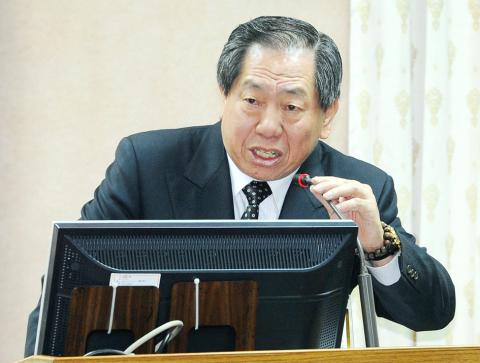National Security Bureau Director Tsai Der-sheng (蔡得勝) yesterday contradicted a statement made by Minister of National Defense Yen Ming (嚴明) on how long the country could withstand a Chinese attack.
Yen had said last week that Taiwan could survive “at least one month,” should China invade, without help from the US, adding the estimate was based on conclusions drawn from various war games.
Tsai was responding a request from Chinese Nationalist Party (KMT) Legislator Chien Tung-ming (簡東明) at a meeting of the legislature’s Foreign Affairs and National Defense Committee yesterday to comment on Yen’s remarks.

Photo: Wang Min-wei, Taipei Times
“The Ministry of National Defense has a better understanding of the military strength of both sides, so it said Taiwan’s military will be able to withstand a Chinese attack for one month. Yet whether the nation is capable of resisting for a month depends on the public’s will to resist an invasion. If everyone wants to leave, [Taiwan] might not be able to withstand for a month,” Tsai said.
He added that modern warfare proceeds very quickly, unlike during World War I or World War II.
Meanwhile, regarding the Legislative Yuan’s review of the cross-strait services trade agreement that is slated to begin tomorrow, Tsai yesterday said that any increased cross-strait interaction runs the risk of compromising national security, as China would attempt to infiltrate Taiwan.
However, he added that the bureau has already made a security assessment last month and taken necessary precautions with all related government agencies, but that the risks were minimal.
The assessment was sent to the Legislative Yuan last week, he added.
Democratic Progressive Party Legislator Tsai Huang-liang (蔡煌瑯) said that 784 Chinese are known to have overstayed their visas, with the number of illegal Chinese in the country coming to more than 1,000 if those smuggled in were also included.
These Chinese are in every part of the country, and pose considerable risk to society and national security, Tsai Huang-liang said.
When asked by if the bureau could get an accurate number on Chinese in Taiwan, Tsai Der-sheng said that if the bureau did not know the whereabouts of a Chinese national, then it did not keep tabs on them.
“We will attempt to find out their location and residence to do our best at maintaining security,” Tsai Der-sheng said.

CHAOS: Iranians took to the streets playing celebratory music after reports of Khamenei’s death on Saturday, while mourners also gathered in Tehran yesterday Iranian Supreme Leader Ayatollah Ali Khamenei was killed in a major attack on Iran launched by Israel and the US, throwing the future of the Islamic republic into doubt and raising the risk of regional instability. Iranian state television and the state-run IRNA news agency announced the 86-year-old’s death early yesterday. US President Donald Trump said it gave Iranians their “greatest chance” to “take back” their country. The announcements came after a joint US and Israeli aerial bombardment that targeted Iranian military and governmental sites. Trump said the “heavy and pinpoint bombing” would continue through the week or as long

TRUST: The KMT said it respected the US’ timing and considerations, and hoped it would continue to honor its commitments to helping Taiwan bolster its defenses and deterrence US President Donald Trump is delaying a multibillion-dollar arms sale to Taiwan to ensure his visit to Beijing is successful, a New York Times report said. The weapons sales package has stalled in the US Department of State, the report said, citing US officials it did not identify. The White House has told agencies not to push forward ahead of Trump’s meeting with Chinese President Xi Jinping (習近平), it said. The two last month held a phone call to discuss trade and geopolitical flashpoints ahead of the summit. Xi raised the Taiwan issue and urged the US to handle arms sales to

BIG SPENDERS: Foreign investors bought the most Taiwan equities since 2005, signaling confidence that an AI boom would continue to benefit chipmakers Taiwan Semiconductor Manufacturing Co’s (TSMC, 台積電) market capitalization swelled to US$2 trillion for the first time following a 4.25 percent rally in its American depositary receipts (ADR) overnight, putting the world’s biggest contract chipmaker sixth on the list of the world’s biggest companies by market capitalization, just behind Amazon.com Inc. The site CompaniesMarketcap.com ranked TSMC ahead of Saudi Aramco and Meta Platforms Inc. The Taiwanese company’s ADRs on Tuesday surged to US$385.75 on the New York Stock Exchange, as strong demand for artificial intelligence (AI) applications led to chip supply constraints and boost revenue growth to record-breaking levels. Each TSMC ADR represents

State-run CPC Corp, Taiwan (CPC, 台灣中油) yesterday said that it had confirmed on Saturday night with its liquefied natural gas (LNG) and crude oil suppliers that shipments are proceeding as scheduled and that domestic supplies remain unaffected. The CPC yesterday announced the gasoline and diesel prices will rise by NT$0.2 and NT$0.4 per liter, respectively, starting Monday, citing Middle East tensions and blizzards in the eastern United States. CPC also iterated it has been reducing the proportion of crude oil imports from the Middle East and diversifying its supply sources in the past few years in response to geopolitical risks, expanding